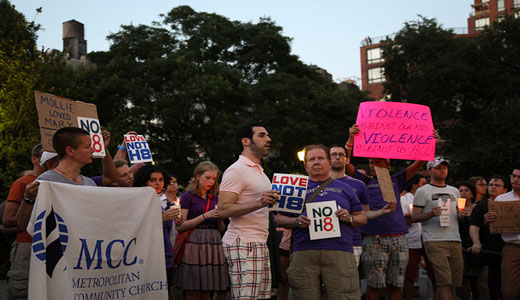
Getting away with murder can be much easier if the victim is transgender or gay. So it’s a major step forward that the American Bar Association has now officially condemned “panic” defenses used to justify such crimes.
In a trial, sometimes a defendant accused of attacking an LGBTQ person in a hate crime will admit to the assault – but will claim that the victim’s sexual orientation or gender justified their actions. The “gay panic” and “trans panic” defenses claim that the perpetrator of hate violence could not help hurting or killing a gay person who made a sexual advance or a trans person whose gender identity they just discovered. The nation’s lawyers, though, now officially reject these “panic” defenses. The American Bar Association, a national lawyers’ professional organization, unanimously passed a resolution at its most recent meeting calling for an end to the use of these defenses in court – thus sending a strong message that legally excusing anti-LGBTQ violence is unacceptable. The resolution not only condemns these legal tactics, but calls on legislatures to enact laws banning them, and encourages judges not to accept them in court.
Such “panic” defenses were famously invoked by Matthew Shepard’s killers in 1999, and by the men who murdered Gwen Araujo, a teenage trans woman living in California, in 2002. In each of these cases, the heterosexual-identified male defendants confessed to the murders they committed – but said that a gay man flirting with them, or the trans identity of a woman they had slept with, was enough to excuse homicide.
Of course, the gay and trans panic defenses only come into play after violence has been committed. Transphobic and homophobic violence are endemic in the United States and across the world. While all LGBTQ people (as well as straight people perceived as LGBTQ) face the risk of assault, trans women of color bear the brunt of these attacks. Racism, misogyny, and transphobia all come together as trans women of color are killed. Bigotry – racist, anti-LGBTQ, and otherwise – often goes beyond discrimination and harassment, and manifests as violence, including murder. This is why members and supporters of the trans community gather every November in cities across the globe to mark Transgender Day of Remembrance, a vigil that mourns the previous year’s victims of anti-trans murder.
Thus, the ABA’s new official position occurs in the context of a reality of violence that faces many parts of the LGBTQ community daily. While rejecting the gay and trans panic defenses is surely a vital step, people’s movements must prioritize stopping anti-trans and anti-gay attacks before a trial needs to happen. Across the country, millions celebrated the Supreme Court’s decisions this summer legalizing same-sex marriage in California and striking down part of the Defense of Marriage Act. Marriage, however, is one issue among many – and for the most vulnerable LGBTQ people, safety remains a far more pressing concern. The LGBTQ movement, the left, and all people’s movements must prioritize defending our communities against racist, transphobic and homophobic violence.
Too many trans and queer people are being killed. It’s time for us to defend our sisters, brothers, and comrades. All of us – LGBTQ and straight – need to band together to create a world where hate murder and other expressions of oppression are no more.
Photo: Candlelight vigil in New York’s Union Square, July 1, 2012, for lesbian teenagers Mary Christine Chapa and Mollie Judith Olgin, who were shot in a park in Portland, Texas. GLAAD CC 2.0

MOST POPULAR TODAY

Zionist organizations leading campaign to stop ceasefire resolutions in D.C. area

High Court essentially bans demonstrations, freedom of assembly in Deep South

U.S. imperialism’s ‘ironclad’ support for Israel increases fascist danger at home


Communist Karol Cariola elected president of Chile’s legislature






Comments